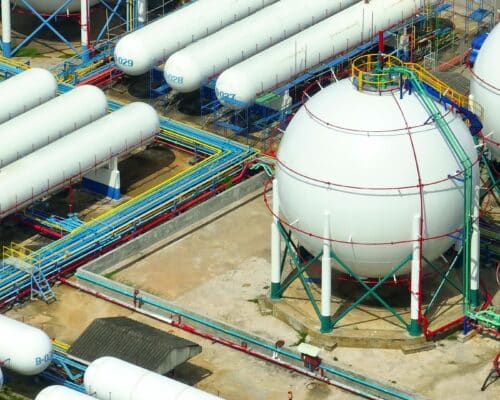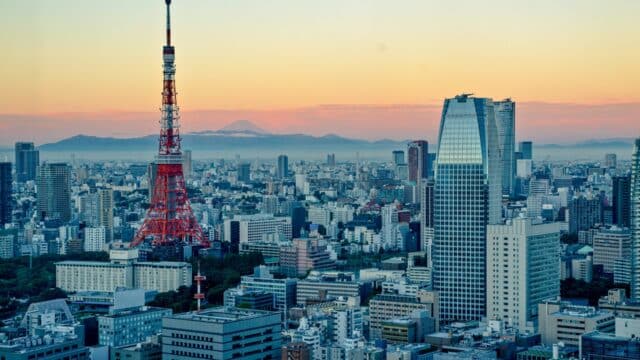Greenwashing on the Agenda at Japan Energy Summit 2024
Photo: Market Forces / Timothee Lambrecq
03 July 2024 – by Nithin Coca
This past June, hundreds of leaders in the energy, finance and government sectors were in Tokyo, Japan, for the Japan Energy Summit & Exhibition 2024. The yearly event is a showcase of everything that is wrong with energy policy and decision-making in Japan, with sessions focused on pushing false and dangerous narratives around energy security, fossil fuels and unproven technologies like co-firing and carbon capture.
“Japan is bulldozing forward with so-called decarbonisation projects that are furthering our dependence on fossil fuels,” said Mia Watanabe, a campaigner from Oil Change International.
The fear is that through venues like the Japan Energy Summit, and sleek, inaccurate and dangerous greenwashing, Japanese companies will succeed in pushing these false solutions across the region, putting global climate goals at risk.
“Japan has continuously failed its climate obligations by growing Asia’s fossil fuel appetite,” said Rere Christanto, campaigns director at WALHI Indonesia, in a press statement. “Instead of embracing a just transition towards renewable energy, the Japanese government, its companies and the fossil fuel industry is digging its heels towards more coal, gas and oil projects.”
What Happened at the Japan Energy Summit 2024?
The Japan Energy Summit was led by Japanese companies, such as JERA, INPEX and Tokyo Gas, but also global oil and gas giants like France’s TotalEnergies, America’s Chevron, Europe’s BP and government officials from Japan, Canada, Indonesia and elsewhere.
If you glance at the agenda, it does not look too bad. Sessions had nice sounding titles, like one on “Demonstrating Global Leadership in Pioneering Innovative Energy Technologies.” But in reality, the so-called innovative technologies being pushed at this panel included fossil fuel derived hydrogen and ammonia co-firing, both with little actual climate benefit.
Similarly, sessions on “Accelerating Decarbonisation” focused on liquefied natural gas (LNG) – a fossil fuel – e-methane and carbon capture and sequestration, which would only perpetuate the use of fossil fuels. It’s probably no surprise that the main sponsors of the conference were fossil fuel companies, who, research and reports have shown, are doing far too little to transition away from oil, fossil gas and coal.
This is textbook greenwashing, painting dangerous and dirty fossil fuel-connected technologies as climate solutions when, in reality, they are not. And Japanese companies are leading the charge.
“This summit only serves to legitimise the false solutions that Japan is propagating,” said Ian Rivera, the national coordinator of the Philippine Movement for Climate Justice. “Japan must instead increase investments in renewable energy and support the just energy transition for a more liveable planet and sustainable future for all.”
Where Are Real Sustainable Energy Solutions?
The Japan Energy Summit 2024 was lacking in panels, speakers or workshops on what economists, investors and scientists see as the real path forward for Asia: clean energy. Already, solar and wind are cheaper than fossil fuels, and geothermal is increasingly seen as a technology with huge potential in places like Japan and Indonesia.
“Southeast Asia has the potential to become a leader in renewable energy manufacturing to contribute to the global renewable energy deployment, while simultaneously achieving economic growth and mitigating the impacts of climate change,” said Antha Williams, who leads the Environment Program at Bloomberg Philanthropies, in a press statement.
There are challenges to expanding wind and solar, such as lacking grid transmission infrastructure in Asia, limited policy incentives and a lack of trained staff to install and maintain wind, solar or geothermal plants. Ideally, the Japan Energy Summit 2024 could have focused on bringing together investors, governments and civil society to overcome those barriers – not greenwash false solutions.

Renewables Can Improve Energy Security
One of the narratives being pushed by the Japanese government and companies like JERA is that fossil fuels like LNG are critical when it comes to energy security. They point to events like the Russia-Ukraine crisis as reasons to maintain diverse energy sources. Similarly, false narratives about renewable intermittency and unreliability were spread at the event.
Yet, there is a growing body of literature and research that says that renewables are actually better for energy security than fossil fuels.
Similarly, renewable intermittency is becoming less and less of an issue due to the rapid drop in prices for grid-scale batteries and other forms of energy storage. Already, in parts of the US and Europe, large batteries are cheaper than natural gas or coal peaker plants, which provide electricity generation during periods of high demand.
Investing in that, not LNG export and import infrastructure, would allow Japan to improve its energy security in a meaningful way. In an ideal world, Japan would play a genuine leadership role, helping Asia transition away from LNG, coal and petroleum and towards real solutions like wind, solar and geothermal.
“Countries with tremendous influence and wealth, such as Japan, have an obligation and responsibility to support a fair, fast and funded phase-out of fossil fuels and to help speed the development of sustainable renewable energy solutions,” said Watanabe.
by Nithin Coca
Nithin Coca covers climate, environment, and supply chains across Asia. He has been awarded fellowships from the Solutions Journalism Network, the Pulitzer Center, and the International Center for Journalists. His features have appeared in outlets like the Washington Post, Financial Times, Foreign Policy, The Diplomat, Foreign Affairs and more.
Read more






